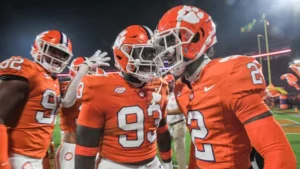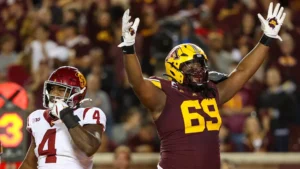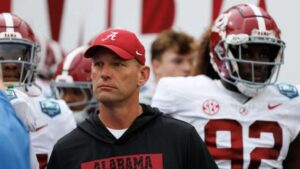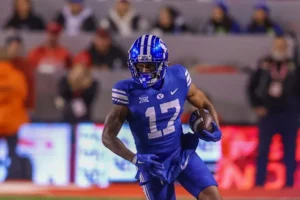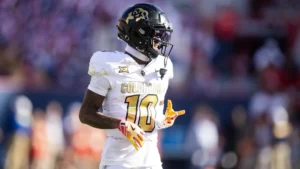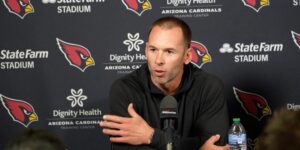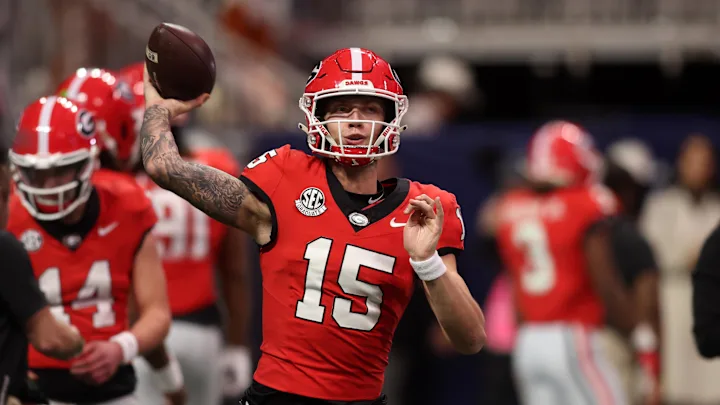
Lane Kiffin Doesn’t Hold Back After Report on Carson Beck’s $4.3 Million NIL Deal at Miami
Lane Kiffin has never been one to mince words. The Ole Miss head coach, known for his dry wit and unfiltered honesty, once again made headlines for his blunt reaction to the latest wave in college football’s name, image and likeness (NIL) era: a report that Georgia quarterback Carson Beck could be making as much as $4.3 million in NIL earnings—if he had transferred to Miami.
While Beck ultimately stayed in Athens, the suggestion that he could have made a multimillion-dollar jump just by switching programs raised plenty of eyebrows across the sport. But few responses carried the same weight—or tone—as Kiffin’s. When asked about the implications of the report, the Rebels coach didn’t dance around the issue.
“That’s not NIL. That’s pay-for-play,” Kiffin said. “Let’s just call it what it is.”
His statement may sound familiar. Kiffin has been vocal for years about how NIL collectives and the transfer portal have rapidly transformed college football into a professionalized free agency system—only with fewer rules and more gray areas. And while he’s hardly the only coach expressing concern about the sport’s new economic landscape, he remains one of the few willing to speak candidly about the scale and specifics of what’s happening behind the scenes.
To be clear, Carson Beck didn’t take the rumored offer. The Georgia quarterback chose to return for another season with the Bulldogs, and the decision was widely praised in the Georgia locker room. But that didn’t stop national chatter from swirling about what it means when a college quarterback—who’s never entered the portal—is potentially being offered that kind of money just to think about it.
Kiffin, who has often joked about the irony of rules that still restrict coaches while letting players operate in a rapidly deregulating system, sees it as the inevitable evolution of a model that was always going to be exploited. For him, this is less about Beck and more about a system that rewards schools with the deepest pockets—or, more accurately, the most well-organized donor collectives.
“If someone can offer you millions of dollars to transfer and play quarterback, and you can still say no, that says a lot about the player and the program he’s already with,” Kiffin said. “But it also says a lot about where college football is headed. This isn’t amateur sports anymore.”
That message—equal parts admiration for Beck and criticism of the system—is a classic Kiffin combination. He isn’t anti-player and has gone on record supporting players getting compensated. What irks him is the lack of transparency, consistency, and enforcement. He’s not alone.
Across the SEC and the broader Power Five landscape, coaches have expressed growing frustration with the lack of guardrails around NIL deals. While the NCAA has made attempts to implement policies, including requiring transparency and discouraging inducement offers, enforcement has proven difficult. In many cases, deals are facilitated by independent collectives operating outside the university structure but tightly aligned with school interests.
Beck’s alleged $4.3 million offer—reported by ESPN and later confirmed as “in the ballpark” by various sources—was a tipping point in the conversation. If a starting quarterback at a College Football Playoff contender can command that kind of offer to leave, what does that mean for players at schools outside the sport’s elite?
“You’re basically saying to a kid, ‘Here’s generational money to leave and start over,’” Kiffin said. “For most 20-year-olds, that’s not a hard decision. It’s a bidding war.”
Kiffin’s comments weren’t entirely new. In previous offseasons, he called out the rise of NIL tampering and what he called the “NFL without a salary cap.” He famously said in 2023 that college football was “professional sports now—just without the contracts.” His point was that schools can’t officially sign players to multi-year commitments, and players can leave with relative ease. The result? Chaos, or at least uncertainty.
Miami, the program reportedly behind the Beck offer, has been at the forefront of NIL investment since the rules changed in 2021. The Hurricanes made national headlines when quarterback Tyler Van Dyke signed a large NIL deal, and booster John Ruiz became one of the most prominent names associated with the NIL movement. Though Ruiz has since stepped back amid legal challenges and investigations, Miami’s aggressive approach to talent acquisition continues to be a talking point.
For some programs, the strategy has paid off. For others, it’s led to locker room instability, increased pressure on young athletes, and unmet expectations. For Kiffin, it’s a reminder that the college game is no longer built on traditional recruiting pipelines or development timelines. Now, it’s about who can build the most appealing package—financial, competitive, and cultural—in a short window.
“The idea that we’re developing kids over three or four years, that’s becoming outdated,” he said. “It’s: can you pay enough to get them here, and can you keep them happy enough to stay?”
Kiffin isn’t without resources himself. Ole Miss has adapted quickly to the new landscape, leveraging the portal and its own NIL structure to land impact players like Jaxson Dart and Quinshon Judkins. But even with those additions, the coach has consistently argued that the current environment favors a small group of schools who can essentially “buy” depth.
In Kiffin’s view, the Beck situation is more than a headline. It’s a warning shot—a signal that the sport is entering a new phase, one where loyalty is a luxury and money talks louder than ever.
“Look, I’m not mad at the players. I get it,” Kiffin said. “If someone offered me $4 million when I was 20 years old, I wouldn’t have hesitated. But don’t tell me this is NIL. Don’t tell me it’s about promoting a brand. That’s a salary. That’s a contract offer to switch teams. That’s not what this was supposed to be.”
Despite the controversy, Beck’s decision to stay at Georgia brought him praise from Bulldogs fans and teammates. It also sparked debate over how often these offers are made and how many go unreported. For every player like Beck, who declines, there are others whose decisions remain behind closed doors.
“It’s the Wild West,” Kiffin said. “And until someone puts up some fences, it’s only going to get wilder.”
In that sense, the Beck report and Kiffin’s response serve as a microcosm of the broader NIL debate—where idealism, realism, and cold, hard cash collide. The NCAA’s hope of balancing athlete rights with competitive integrity is, so far, more aspiration than reality.
For now, programs are left to navigate this new world on their own, hoping to strike the right mix of financial support and institutional culture to keep their rosters intact. Kiffin, for his part, says he’ll keep adjusting. But don’t expect him to stay quiet.
“We’re going to play the game, because we have to,” he said. “But if you think this is sustainable—if you think this is good for the sport—I don’t know what to tell you.”
There’s a growing sentiment in college football that something has to change. Whether it’s congressional intervention, a players’ union, or a new governance model, the calls for reform are getting louder. But until then, stories like Beck’s will continue to dominate headlines, and coaches like Kiffin will continue sounding the alarm.
“I’m not trying to be the bad guy,” Kiffin added. “I’m just saying what everyone else is thinking. If we don’t get a grip on this, the game we love is going to look a lot different—and not in a good way.’
